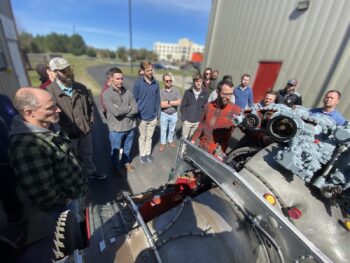2026 Short Course: Introduction to Jet Engines – A Practical Perspective
WHEN and WHERE: Tuesday-Thursday, 13-15 January 2026 at Makino, 7680 Innovation Way, Mason, OH 45040. Class runs from 8:00 to 4:30 the first two days and from 8:00 to around noon on the third day.
COURSE DESCRIPTION and MATERIALS: This 20-hour course is all about gas turbine engines (GTEs) and how they are used in various air-breathing propulsion systems. After taking this course, you will have a new-found understanding of the extraordinarily challenging “jet” engine operating environment. From a very practical perspective, you will be introduced to the fundamentals of the engine core (compressor, combustor, and turbine) and the various GTE propulsion systems. Where practical, a field trip will reinforce classroom discussions by examining actual engines and specific examples of airframe-engine(s) integration. With clear learning objectives, the following topics are presented and discussed:
You will be given a set of course notes and a copy of Klaus Hunecke’s text, Jet Engines — Fundamentals of Theory, Design, and Operation. 2.0 Continuing Education Units (CEUs) are awarded.

WHO SHOULD ATTEND: This course is designed for anyone working with GTE applications who wants to gain a practical appreciation for and foundational understanding of gas turbine engines — engineers, scientists, maintenance, repair, overhaul, operational, managers and administrative support personnel. A building-block approach is used — no prior knowledge is assumed. Since 2002, we’ve taught thousands of “students” from audiences across the Air Force, Navy, NASA, FAA, and industry. Our instructors have earned a tremendous reputation for teaching fundamental aeronautics and propulsion — in our classroom, theory and practical application come alive!
Here are a few comments from recent offerings:
“Instructors have a wealth of complimentary experience to bring to [the] course – airframe versus power – maintenance versus operator – designer versus analysis. Very responsive to questions – nice!”
Cleveland, OH
“This course will assist me in my job. I’ve been reading design texts and engine texts over the last year to pick out the nuggets this course gave me in 2.5 days. Keep up the good work!”
Dayton, OH
“Liked the practical applications – didn’t just learn why the engines work and are designed the way they do/are…We also learned why that’s important and how to use it. Great level of detail – explained well for the non-techies but with enough info and details for the techies”
Oklahoma City, OK
COURSE DIRECTOR: Dr. Keith Boyer is the President of Practical Aeronautics. He retired from the Air Force as a Colonel in 2012 after serving as Associate Dean for Students at the Air Force Institute of Technology. He started his Air Force career in 1979 as an enlisted electronic warfare maintainer on B-52 aircraft and instructor. His aircraft-engine experience includes maintenance & sustainment at the flight line, intermediate and depot levels, research & development, test and analysis, systems engineering, sustainment, logistics & supply chain management, and multinational requirements management. Keith taught for ten years in the Air Force Academy’s Department of Aeronautics and served in numerous leadership positions. For seven years, he was adjunct faculty to the Air Force Test Pilot School, where he twice earned the Flight Test Instructor of the Quarter award.
COST, REGISTRATION, and CANCELLATION POLICY: $1475 ($1425 if registered by 19 Dec 2025), $1405 for Federal Government employees. Group rates available. For more information and to register, visit PracticalAero.com, contact JEllsworth@PracticalAero.com, or call (719) 659-7319. Substitutions may be made at any time. Cancellations must be received two weeks prior to course start date and are subject to a $50 fee. If you must cancel within the two-week period, and do not have a substitute, you may forfeit the entire fee. Refunds of the registration fee (only) are issued if the course is cancelled. Practical Aeronautics will not be responsible for any travel/lodging costs incurred by the student if the course is cancelled.
Share this course with your colleagues: Download the PDF
2025 – This is the intellectual property of Practical Aeronautics, Inc. (www.practicalaero.com). Please treat accordingly.
